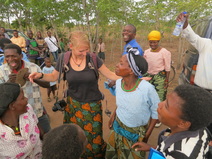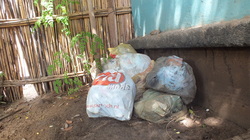To some extent I do understand this tradition of allowances to attend workshops and meetings. When I organize a workshop at community level, participants have to give up a working day to attend. That means they can’t go to the market to sell their produce, work on the land or find day-jobs. Of course, in the long run they can earn back the money with the things we teach them. But most of the local people do not have time to wait for the long run. They can’t miss the short-term income of a working day. I don’t mind at all to pay these people 1000 Kwacha (2 Euros) to attend a workshop. In the beginning I was afraid that they would just come for the allowance, pretending to be interested in the subjects. But I was wrong; the majority of the local people have proved themselves to be active and very willing students. Even when we had to cut down the allowances because of lack of budget, they still showed up and were equally enthusiastic. OK, they did complain a bit, but they were there.
I had more (moral) problems giving out allowances to my colleagues. They are officers who get a monthly salary to do their jobs, and still I had to pay them to come to my meetings and workshops. I was teaching them, to improve their skills, extend their knowledge and to help them manage projects, and I had to pay them for it? I still think this system of working is completely insane. In the beginning I was very reluctant to receive or pay any allowances, until one of my colleagues explained to me why they are so important for the Malawian officers. When he told me how much they earned a month I was shocked. The salary of government officers, with a college degree, is notenough to support their families. They need the extra allowances to pay school fees and uniforms for their children, to pay the rent of their house. Mind you, this is the so-called middle-class of Malawi. In my opinion, this system is rather problematic. Working for an NGO, with the same education and degree, you earn at least 3 times more than an officer. Of course ,everyone who has the opportunity will transfer to an NGO. Naturally these are mostly the men (or women) who are best at their jobs. I can’t blame them.
As a result a lot of the officers are poorly motivated and always looking for better opportunities. They try to attend as many workshops and meetings as possible, no matter what the subject is or its importance to them. I quickly discovered that handing out invitations to workshops is a pretty sensitive business that should be handled carefully. They all want to come and will demand an explanation when they are not invited. In the beginning I was flattered that they were all so eager to attend my workshops. It didn’t take long, however, before I discovered the truth. Officers are quite good at getting these allowances without actually participating. They simply walk in at the beginning of your workshop, write their names down on the attendance list and walk away after a few minutes pretending to answer a phone call. When you are closing the workshop, they return and stand in line to receive their allowance.
I can’t even blame them. It is the system that is to blame. Salaries are fixed on national level, and bureaucracy impedes changing the regulating systems. Raising salaries and do away with the allowances would be a good development for Malawi, since the allowances add to corruption and cause all kinds of problems (not in the least that not one of the attendance lists of my workshops is accurate). It is so much integrated in the Malawian culture, however, that the Malawians can’t think of any different way of working. While I can at least understand the behavior of my colleagues towards the allowances, I discovered to my shock and horror that even well-paid specialists, NGO-employees, managers etc, are doing the same tricks to get allowances as less-earning Malawians do. They cheat with attendance lists, reimbursements and fuel receipts. Whatever it takes to get more money. And everyone thinks it is the most normal thing to do. When I try to convince my colleagues that this is a form of corruption, they deny. It is just the way it is. This is how Malawi works.
During the past year I discussed this issue a lot with the Malawians, both NGO and government employees. I noticed that especially with the NGO’s, the opinion is losing ground that it is ‘just the way it is’. But it is still way too much accepted. There are no penalties whatsoever for cheating with the allowances. A friend of mine experienced this herself. When she caught a colleague swindling and stealing, she decided to report this to her company’s director. His response was that they should pray for the colleague, and to ask God to give him the strength to change his behavior. I highly doubt the effectiveness of this measure.
The only thing I can hope for is that the elections in April 2014 will start new discussions about the current system. At the moment a huge corruption scandal is getting out in Malawi, which includes the current president. The Malawians are sick and tired of high-placed officers and managers stealing money. Let’s hope the elections will nudge them to speak up and slowly change the way Malawi works.





 RSS-feed
RSS-feed
